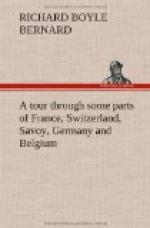I had been recommended to the Hotel de Pondicherry, by a gentleman who had for some time lodged there; but I found there were no vacant apartments. After making application in vain at many of the hotels in the Rue de Richelieu, I at last succeeded in meeting with good accommodation in the Hotel des Prouvaires, which was in a convenient situation, and had the advantage of having been lately painted. I found the people of the house very civil and attentive, and produced my passport from the Secretary of States’ Office, signed by Lord Castlereagh, to satisfy them that I was no avanturier, a very numerous class here. The expence I found differed but little from, that of most of the hotels in London; but the French hotels are in fact more what we should call lodging-houses, as they do not supply dinners, &c. which must be procured from a restaurateur’s, of which there are a vast number; and I have heard it stated, that there are no less than 2500 coffee-houses in Paris.
The population of Paris is stated by Marchant, in the last edition of his Guide to Paris at 580,000; the number of houses is estimated to be 29,400; this would give an average of nearly twenty persons to each house. This I do not consider as too great a proportion to allow, if we consider the vast number of hotels that can contain at least double that number of persons; and that in many parts of the town each story is occupied (as in Edinburgh) by a separate family.
The population of Paris has undoubtedly decreased since the revolution; Dutens, who published his Itinerary about thirty years ago, tells us, at that period the inhabitants of Paris amounted to 650,000: but even supposing him to have over-rated them, still there remains a great disparity in the two calculations, and it is reasonable to conclude, that the present statement by Marchant is accurate, from the facilities which the system of police affords in forming a just calculation on the subject.




